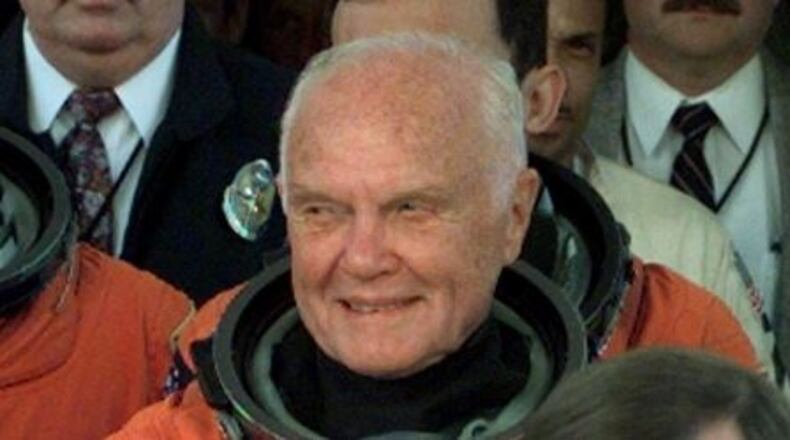"Zero-G and I feel fine," Glenn said as he traveled in the spaceship named Friendship 7.
After leaving the space program, Glenn won election to the U.S. Senate in 1974, serving there until he retired after the 1998 elections.
"Senator John Glenn lived a remarkable life—full of bravery, adventure and most importantly, service," said Rep. Pat Tiberi of Ohio.
"He will be remembered as one of Ohio’s greatest and most heroic legends."
"John Glenn is the last of the original seven American astronauts who truly had the 'right stuff,'" said Sen. Bill Nelson of Florida, who labeled Glenn an "unabashed patriot."
Glenn had dreams of going national in politics, as he drew on his popularity to make a run for President in 1984.
But Glenn finished fifth in Iowa, and was unable to generate momentum in New Hampshire and other states.
The Ohio Democrat returned to the Senate, where he would give a memorable speech in 1986, when the Senate began televising its proceedings.
"Mr. President, I will not say that TV in the Senate is going to change anything," as Glenn poked fun at advice that had been given to Senators on how to dress, and even how to apply makeup to reduce the shine from a balding pate.
"We have even had advice not to do - as I did today - to come in with a plain old white shirt and a summer tie. Heaven forbid," Glenn said to chuckles from the galleries in June of 1986.
C-SPAN, which televised that first day, has the video of Glenn's first Senate floor speech .
Glenn's record in Congress was somewhat tarred by his involvement in the Keating Five scandal; Glenn was reprimanded for his links to Charles Keating, who ran Lincoln Savings and Loan, which collapsed and was bailed out by the feds.
I always remember that Glenn sat ramrod straight at the witness table during those Senate Ethics hearings - almost like he was in a space capsule - as he defended his links to Keating, and defended his personal honor.
Near the end of his Senate career, Glenn returned to space, flying aboard the Space Shuttle as a payload specialist.
"To look out at this kind of creation out here and not believe in God is to me impossible," Glenn said.
"John Glenn, as President Kennedy perhaps best put it, was “the kind of American of whom we are the most proud.”" said John Bisney, a radio reporter who covered the space program, and now a space historian.
"What more could one man ask for or achieve?" Bisney told me, saying he will "always remember Senator Glenn as a modest, polite and principled man who always put his country first."
My father had his own great story about Glenn, when the Ohio Senator wanted to borrow a car for the weekend (my dad was a lobbyist at the time for Ford Motor Company).
"I delivered it to him on the Hill and he insisted that he take me back downtown even though I told him I had to come to the Hill anyway," my dad told me.
"On our way he started questioning me about the Lincoln engine, not only the horsepower, but the torque of the engine, etc.," my dad recalled, as he finally had to stop Glenn and explain that he was a legislative guy, not an expert on horsepower.
My own memories of Glenn during the more than a decade that I covered him on Capitol Hill were much the same - the Ohio Democrat was a genuinely nice person, not at all hung up on who he was, or what he had done.
But, because of Glenn's status in the space program - he was one of the very few members of Congress that I was a bit overwhelmed by, when I first met him.
The Ohio Democrat was more than a Senator, he was a national hero.
About the Author

